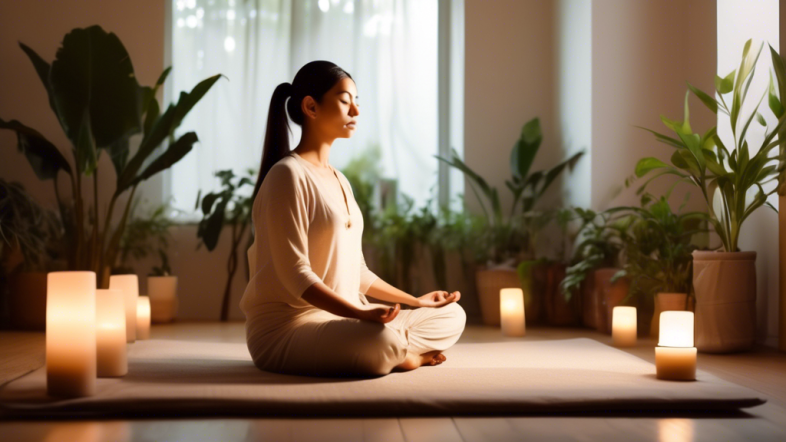Why Practice Mindfulness Meditation? Understanding the Benefits for Beginners
Embarking on the journey of mindfulness meditation for beginners is a rewarding step towards enhancing both your mental and physical well-being. Mindfulness meditation, a practice rooted in ancient traditions, has gained immense popularity in contemporary wellness circles for its ability to foster a deeper sense of inner peace and clarity. For those starting out, understanding the manifold benefits can provide a powerful motivation to integrate this practice into daily life.
Research continually highlights the significant impact of mindfulness meditation on overall health. Physically, it can lower blood pressure, improve sleep quality, and boost the immune system. Mentally, it helps reduce anxiety, enhance cognitive functions, and cultivate a profound sense of calm. The practice trains the mind to focus on the present moment, which in turn can dramatically reduce stress levels and improve concentration.
For beginners, the journey may seem daunting, but the rewards are plentiful. A consistent mindfulness meditation practice can transform how you experience and interact with the world. This article guide aims to make this journey approachable and manageable by breaking it down into simple steps, highlighting common challenges and providing solutions, ensuring you have all the tools you need to start and sustain your practice successfully.
Why Practice Mindfulness Meditation? Understanding the Benefits for Beginners
Stepping into the world of mindfulness meditation for beginners can feel like embarking on an uncharted journey. However, the rewards it offers are abundant and well worth the effort. Whether you’re looking to enhance your well-being, improve your mental health, or simply find a reprieve from the hustle and bustle of daily life, mindfulness meditation provides a simple yet powerful tool.
Mindfulness meditation, at its core, involves focusing your attention on the present moment, acknowledging thoughts, and observing them without judgment. This practice fosters a state of heightened awareness and acceptance, which can lead to profound transformations in both mind and body.
The Physical and Mental Health Benefits
One of the most compelling reasons to practice mindfulness meditation is its wide array of health benefits. Research has shown that regular meditation can lead to significant improvements in physical health. For instance, it can lower blood pressure, reduce the risk of heart disease, and even boost the immune system. By quieting the mind and calming the nervous system, mindfulness meditation supports the body’s natural healing processes.
For mental health, the impact of mindfulness meditation can be equally impressive. Studies indicate that it can reduce symptoms of anxiety and depression, improve mood, and enhance overall emotional well-being. By cultivating a practice of mindfulness, you can learn to navigate negative emotions and thoughts more effectively, fostering a sense of inner peace and stability.
How Mindfulness Meditation Can Improve Focus and Reduce Stress
In today’s fast-paced world, maintaining focus and managing stress can be challenging. Mindfulness meditation for beginners offers a practical solution to these modern woes. By training your mind to stay present, you enhance your ability to concentrate on tasks, making you more efficient and less susceptible to distractions.
The practice of mindfulness also plays a crucial role in stress reduction. When you meditate, you activate the body’s relaxation response, which counteracts the stress hormones that flood your system during times of tension. This not only helps in managing daily stress but also improves your resilience to future stressors. Over time, regular meditation can lead to a more balanced and harmonious state of being, where stress no longer controls your life but is managed with greater ease.
Mindfulness meditation for beginners is not about striving for a goal or perfecting a technique. Instead, it’s about learning to be present, appreciating the moment, and fostering a more compassionate relationship with yourself and the world around you. As you begin your journey, remember that each practice session, no matter how small, contributes to your overall sense of well-being and personal growth. So, welcome the experience with an open heart and mind, and watch how mindfulness meditation transforms your life step by step.
Step-by-Step Guide to Starting Your Mindfulness Meditation Practice
Embarking on a journey into mindfulness meditation for beginners might seem daunting, but it doesn’t have to be. This step-by-step guide will help you establish a strong foundation, making your meditation practice accessible and enjoyable from the very beginning.
Setting Up a Conducive Environment for Meditation
The environment in which you meditate plays a crucial role in the effectiveness of your practice. For beginners, creating a space that encourages calm and focus is essential. Here are some tips to help you set up a conducive environment for mindfulness meditation:
- Find a Quiet Space: Choose a spot in your home where you are unlikely to be disturbed. This could be a corner of your bedroom, a spot in your living room, or even a dedicated meditation room if you have the space.
- Comfortable Seating: Whether you prefer sitting on a cushion, a chair, or even lying down, the key is comfort. Ensure that your chosen seating doesn’t cause strain or discomfort during meditation.
- Neutral Lighting: Soft, natural light is ideal, but if that’s not possible, use dim lighting to create a relaxing ambiance. Avoid harsh, bright lights that can be distracting.
- Minimal Distractions: Clear your space of potential distractions. This includes turning off electronic devices, ensuring pets are occupied, and informing household members of your meditation time.
- Personal Touch: Add elements that enhance tranquility for you personally, such as calming scents from incense or essential oils, or a favorite blanket.
Simple Techniques and Exercises to Begin With
Now that your environment is ready, it’s time to delve into the actual practice of meditation. As a beginner, it’s best to start with simple techniques and gradually build your practice. Here are some exercises to get you started:
1. Focused Breathing
Step-by-step:
- Find a comfortable seated position.
- Close your eyes and take a few deep breaths to settle in.
- Direct your attention to your breath. Notice the sensation of the air entering and leaving your nostrils.
- Whenever your mind wanders, gently bring your focus back to your breath.
- Continue this practice for 5-10 minutes.
Benefits: Focused breathing helps center the mind and is an excellent foundational practice for beginners in mindfulness meditation.
2. Body Scan Meditation
Step-by-step:
- Lie down comfortably on your back or sit in a comfortable position.
- Close your eyes and take several deep breaths to relax.
- Start at the top of your head and progressively bring your awareness to different parts of your body down to your toes.
- Notice any sensations, tension, or discomfort in each part of your body.
- If your mind begins to wander, gently bring your focus back to the body part you were concentrating on.
- Conclude by taking a few deep breaths and gently opening your eyes.
Benefits: Body scan meditation increases bodily awareness and helps in releasing tension and stress, making it a valuable practice for beginners in mindfulness meditation.
3. Loving-Kindness Meditation
Step-by-step:
- Find a comfortable position and close your eyes.
- Take several deep breaths and focus on your heart area.
- Silently repeat phrases such as “May I be happy, may I be healthy, may I be safe, may I live with ease.”
- Extend these wishes to others, starting with loved ones and gradually including all beings.
- Whenever your mind wanders, gently bring it back to the phrases and the individuals you are focusing on.
- End the session with a few deep breaths and open your eyes with a sense of gratitude.
Benefits: Loving-Kindness meditation fosters compassion, reduces negative emotions, and enhances overall emotional well-being—key areas for mindfulness meditation for beginners.
Establishing a Regular Meditation Routine
Consistency is crucial in mindfulness meditation for beginners. Building a regular routine will help you cultivate discipline and experience the full benefits of your practice. Here are strategies to help you establish and maintain a regular meditation routine:
- Start Small: Begin with short sessions, such as 5-10 minutes daily, and gradually increase the duration as you become more comfortable with the practice.
- Set a Schedule: Consistency is key. Dedicate a specific time each day for your meditation practice, whether it’s first thing in the morning, during lunch, or before bed.
- Use Reminders: Set reminders on your phone or use a meditation app to prompt you to practice daily.
- Track Your Progress: Keep a meditation journal to note your experiences, progress, and any challenges you encounter. This can serve as a motivational tool and provide insights into your practice.
- Be Patient: Understand that meditation is a journey. Some days may be easier than others. Be gentle with yourself and keep practicing.
By following these steps and techniques, beginners can lay the groundwork for a successful and enriching mindfulness meditation practice. Remember, the goal is not to achieve perfection but to cultivate a sense of presence and awareness in each moment. Happy meditating!
Common Challenges Faced by Beginners and How to Overcome Them
Starting your journey with mindfulness meditation for beginners is an exciting but sometimes challenging experience. Many new practitioners encounter obstacles that can make it difficult to maintain a regular practice. Understanding these challenges and how to address them is vital for sustained success. Here, we identify typical obstacles beginners face, provide practical tips to stay motivated and consistent, and suggest resources and tools for continued learning and practice.
Identifying Typical Obstacles in Mindfulness Meditation for Beginners
Embarking on mindfulness meditation for beginners often comes with a variety of hurdles. Recognizing these common challenges can help you prepare and develop effective strategies to address them.
- Restlessness and Impatience: Many beginners find it hard to sit still and quiet their minds, leading to feelings of restlessness and impatience.
- Distractions: External and internal distractions can disrupt your focus. It’s common to get lost in thoughts about daily tasks or worries.
- Self-Doubt and Perfectionism: Some beginners may struggle with self-doubt, believing they are not doing the practice correctly or achieving the desired results.
- Consistency: Establishing and maintaining a regular meditation practice can be challenging amidst a busy schedule.
Practical Tips and Solutions to Stay Motivated and Consistent
Addressing these challenges effectively is key to progressing in your mindfulness meditation practice. Here are some practical tips to help you stay motivated and consistent:
- Start Small: Begin with short sessions of about 5-10 minutes. As you become more comfortable, gradually increase the duration.
- Designated Space: Create a peaceful, dedicated space for your meditation practice. This space should be free of distractions and conducive to relaxation.
- Routine: Establish a regular meditation schedule. Consistency is essential, so find a time of day that works best for you and stick to it.
- Accept Imperfection: Understand that meditation is not about perfection. Accept that your mind will wander, and gently guide it back to your point of focus without judgment.
- Use Guided Meditations: Follow guided meditation sessions, especially at the beginning. They can provide structure and support, making it easier to stay on track.
- Patience and Compassion: Be patient with yourself. Progress in mindfulness meditation for beginners can be slow, but every effort counts towards improvement.
- Community: Join meditation groups or online communities. Sharing experiences with others can provide motivation and accountability.
Resources and Tools for Continued Learning and Practice
Leveraging resources and tools can enhance your mindfulness meditation practice and help you overcome challenges more effectively. Here are some recommended resources and tools:
- Meditation Apps: Apps like Headspace, Calm, and Insight Timer offer guided meditations, reminders, and progress tracking to support your practice.
- Books: Reading books on mindfulness meditation can deepen your understanding and provide new techniques. Popular titles include The Miracle of Mindfulness by Thich Nhat Hanh and Wherever You Go, There You Are by Jon Kabat-Zinn.
- Online Courses: Enroll in online courses or workshops to receive structured learning and access to experienced instructors. Websites like Coursera and Udemy offer a range of options.
- Podcasts and Videos: Listen to podcasts or watch videos by mindfulness experts. These can offer valuable insights and tips to improve your practice.
- Journaling: Keep a meditation journal to reflect on your experiences, challenges, and progress. This can help you stay mindful and intentional in your practice.
By understanding and addressing common challenges, implementing practical tips, and utilizing helpful resources, beginners can build a successful and sustainable mindfulness meditation practice. Remember that mindfulness is a journey, and every step forward, no matter how small, is a part of your growth.
Conclusion: Embracing the Journey of Mindfulness Meditation
Embarking on the path of mindfulness meditation for beginners is a transformative journey that offers abundant rewards. By understanding the significant physical and mental health benefits, you are already one step closer to a more centered and peaceful life. Embracing the techniques and practices detailed in this guide can help lay a solid foundation for a lifelong meditation practice.
Remember, the key to successful mindfulness meditation lies in consistency and patience. Set up a calm and inviting meditation space, start with simple exercises, and gradually build your routine. It is natural to face challenges as a beginner, but with practical solutions, motivation, and the right resources, you can navigate these obstacles with ease.
Ultimately, mindfulness meditation is a personal journey that unfolds uniquely for everyone. By committing to this practice, you are giving yourself the gift of inner peace, improved focus, and resilience against stress. Embrace the journey, be kind to yourself, and enjoy the multitude of benefits that mindfulness meditation brings into your life.


